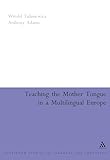Teaching the Mother Tongue in a Multilingual Europe [Book] / edited by Witold Tulasiewicz and Anthony Adams.
Material type: TextSeries: Continuum Collection SerPublication details: London : Continum, 2005.Description: 230 p. : ill ; 09.710 x 06.760 inISBN:
TextSeries: Continuum Collection SerPublication details: London : Continum, 2005.Description: 230 p. : ill ; 09.710 x 06.760 inISBN: - 0826470270
- 371.102 21
- 371.102
| Item type | Current library | Call number | Status | Date due | Barcode | Item holds |
|---|---|---|---|---|---|---|
 Books
Books
|
Junaid Zaidi Library, COMSATS University Islamabad 2nd Floor | 371.102 TEA (Browse shelf(Opens below)) | Available | 30862 |
Includes index.
Annotation In a time when the increasing cultural diversity and population mobility of the continent calls for good communication skills, this fascinating book features a wealth of data and critical opinion on the topic of mother tongue education.In the first part of the book, the two editors address central cultural, political and educational concerns relating to the mother tongue, using some of the findings of their European Commission funded research on the changing European classroom. The second part presents case study articles by practitioners from nine countries which have significant regional or immigrant mother tongue populations. These include Welsh in Wales, Catalan and Galician in Spain, Turkish and Greek in Germany, Arabic and Corsican in France, and Belorussian in Poland, as well as critical accounts of the main first language situation in England, Denmark, France, Germany, Poland, post-Soviet Russia, and Spain.


There are no comments on this title.